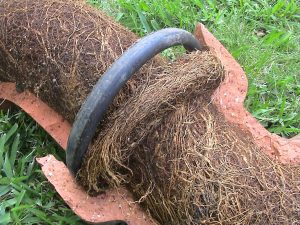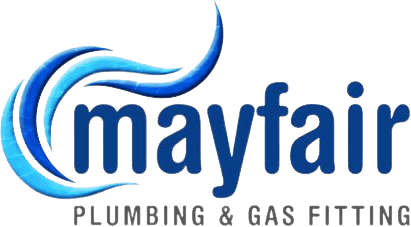It is important to have an efficient and clear drainage system in your home 24/7. Unfortunately, most people ignore the signs of a blocked outside drain until it’s too late. This problem occurs when external drains are blocked. As a result, water cannot flow to an outlet or into the city (or even country) sewer systems where it needs to go to keep everything sanitary for ourselves, neighbors, pets–everyone!
Apart from the potentially harmful health and environmental impact, a blocked outside drain can result in structural damage to your home. Fixing such damage can render you homeless and cost thousands of dollars to fix. So, how do you avoid losing money to an avoidable problem?

tree roots from blocked drain
How do I know if my outside drain is blocked?
A blocked drain can wreak havoc on any property. However, before things get out of hand, several tell-tale signs help you know when to take action on your clogged drain.
- Slow draining
Notice your sewer line draining slowly? A slow draining sink or shower suggests blockage. Have plumbers fix it before it gets worse.
- Overflowing
While a well-functioning drain should have water flowing down, a faulty one spills the water back up. If you notice an overflow around your drain, it is a sign of a blockage in your sewer line. Call your plumbing service and have it fixed.
- Foul smell
If you have your outside drain blocked, a foul smell is sure to come at some point. First, inspect your property to see if you can pinpoint the problem and where it’s located. If you can’t do this, contact your plumbers and have this done as soon as possible.
- Gurgling sounds
If you notice a gurgling sound when using your sink or garbage disposal unit, it may be time to contact a plumbing service. Gurgling sounds are an indicator of a drain blocked with mud, soil, or other accumulated dirt.
What Causes Blocked Drains?
It is essential to learn how to unblock outside drains and know where your responsibility lies as a property owner. However, knowing why you have blocked drains tops the list. It helps you pinpoint problems and find solutions faster.
The most common culprits for a blockage for outdoor drains are leaves, branches, tree roots, soil, mud, litter, moss, and other debris outside your home.
Still, the items you flush or pour down your pipes can result in a clogged drain. These include FOG (fats, oils, and grease), coffee grounds, food, hair, soap, wet wipes, excess toilet paper, dental floss, cotton buds, nappies, and other sanitary items.
When left to collect over time, one or several of these items pose a threat to your property, loved ones, and community. That said, the responsibility to drain blockages depends on where the drainage system lies. If it is within the boundaries of your property, the responsibility lies with you.
Drainage systems running through shared spaces within your neighborhood are the responsibility of your local water and sewerage company.
How To Unblock A Drain Outside
Outdoor drains are connected to internal plumbing from your house and other surrounding properties. As a result, they make for a nasty surprise when left to block or clog. While some blockages can be removed without a fuss, some require you to call a professional plumbing service. As such, it is wise to have a reliable plumber to turn to before your situation becomes worse.
Whether you choose to unblock an external drain by yourself or hire a professional, the process comes down to the following steps:
Step 1: Assessment
A comprehensive assessment will help you determine the origin and extent of the problem. It also enables you to decide whether or not you can drain the blockage on your own or need a professional to do it.
For an adequate assessment, you need to access the drainage.
This means removing the drain cover to see what’s causing the blockage and how far it is, whether near the surface or out of sight.
Step 2: Finding the right tools
Having the right tools for the job is essential in handling drain blockage. First and foremost, ensure self-protection by wearing protective clothing. These include rubber gloves, waterproof boots, long sleeves, a mask, and goggles to prevent direct contact with any splutter.
Next, obtain a drain snake, drain rods, and a pressure hose. These tools are thin, long, and flexible to ensure you safely reach and unblock an outside drain.
Step 3: Removing the blockage
Removing the blockage in an outdoor drain is a two-part affair. In the first part, you need to glove up, reach your hand inside the clogged drain and remove as much debris as you can by hand. Messy as this sounds, it helps create enough room for the clog culprits to shift so you can use the tools you have in your arsenal successfully.
Secondly, use your drain rod and drain snake to push through the sludge. The auger head of a drain snake entangles even the most stubborn debris, while a drain rod helps you apply pressure to whatever’s left in your drainage system.
Step 4: Clean Up
Using a pressure hose, give the drain a final cleanse. Please repeat this step as many times as you need to ensure the pipes are clear and water is running through the drains as it should. A thorough service of your drains will prolong the life of your pipes and ensure your sewer system works perfectly.
Step 5: Stubborn outdoor drain. What do I do?
If you use all the steps mentioned above, but blockages remain a problem in your property, it’s time to bring in experts for the job. Call a local plumbing service if the cause for blockage is more than you can handle, like tree roots or excess mud and silt. Professional plumbers know the proper methods and have the equipment to unblock an outside drain and unclog any sewage system.
How To Prevent Drain Blockages
If your drainage system doesn’t take away the water as fast as it should, you should be very concerned and either try to get the issue resolved or call in experts. If left unattended, blocked drains will cause nasty smells in your home, attract rodents and insects, increase the danger of bacteria around your family, or cause overflowing in your house.
Therefore, if you see blockage signs, preventing it from happening should be a priority. It will save you a ton of money, headaches, and probably embarrassments. Here are some tips to help you maintain clear pipes and ensure your plumbing runs its entire course.
- Carry out a regular assessment of tree roots in your compound to ensure they don’t break any drain.
- Dispose of tree and garden foliage appropriately to ensure they don’t move into your drains and cause blockage.
- Regularly inspect your overflow relief gully by checking the water level. A high water level is a sure sign of blockage that should be addressed before causing damage to your property.
- Make appropriate use of your drains. For example, solid waste that can cause blockage should never be discarded in the sink or flushed down the toilet.
- Regularly clean out any downpipe or sewer on your property using a pressure hose. This ensures mud and other debris don’t get stuck. In addition, the rate at which water passes through a pipe or sewer can tell you whether or not it’s blocked.
Home solutions for clearing a blocked drain
The equipment and methods used to clear a blocked drain depend on what clogged it. Among the home remedies you can use before making contact with your plumber include:
Boiling water
Boil water with your kettle and pour it down the drain. The heat from boiling water is perfect to shift dirt, clear blocked pipes by melting fats and oils that may be blocking them. It also helps loosen other kinds of material such as hair or grease, which could be causing a blockage in your drainage system.
Plungers
If you want to keep your drains clear with minimal effort, then a plunger is the tool for you. These inexpensive gadgets create an airtight seal around drain openings and can easily unblock even the worst clogs in seconds flat by creating pressure that moves blockages out of sinks without any mess or fuss on your part.
Once the blockages start shifting (you’ll notice it when the water begins to drain), remove the drain cover and use rods to get the dirt out. In some instances, the debris causing the drainage could be pushed down further from reach. If that happens (which it does in most cases), simply pour a mix of baking powder and vinegar down your drain, wait for a few minutes then hose down the drain.
Natural cleaners
Natural cleaners like bicarbonate of soda, baking powder, and vinegar are great for clearing a blocked pipe, sink, and drains. They create a fizzing effect to help break blockages into smaller parts. For effectiveness, pour hot water, then add ½ cup of bicarbonate soda and 1½ cups of vinegar. Let the mixture fizz for 5-10 minutes, then add more hot water to ensure your pipe is clean and drains well.
DIY drain snake
Before you call in the cavalry, get creative and use a DIY drain snake to try to remove dirt from your blocked plumbing. You can make this using a coat hanger or other long metal wire with bent ends that are looped together for gripping. – then stick one end into the plug hole and fish out any and all materials that could be causing the blockage, e.g., dental floss, hair, and strings
Caustic cleaners
If all the above methods have failed, you can try caustic cleaners. The chemical properties of caustic cleaners effectively dissolve stubborn blockages and leave drains clean and clear.
NOTE:
When using these cleaners, ensure:
- Your home is adequately ventilated to avoid inhaling dangerous fumes.
- Cover your hands with rubber gloves before application of the cleaner.
- Consider wearing goggles and a breathing mask or a gas mask.
I Can’t Get My Drainage To Unblock. What should I do?
If you’re left wondering how to unblock an outside drain, even after trying these tips, then it’s time to call in your local Adelaide plumber.
We have the expertise and tools, such as a pipe camera to extract even the toughest drain blockage. A professional hand is often all it takes to get your plumbing back to normal without making the situation worse.
When you can’t get past that stubborn blockage, call drainage experts such as our team at Mayfair Plumbing & Gasfitting.
Call us today to get your drainage sorted.




